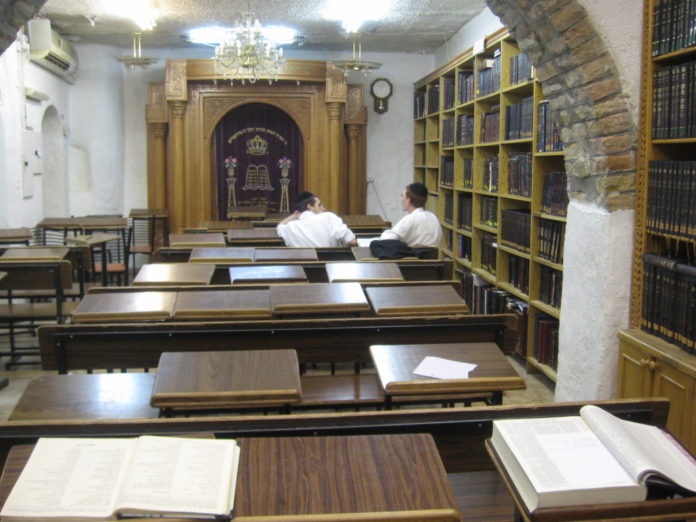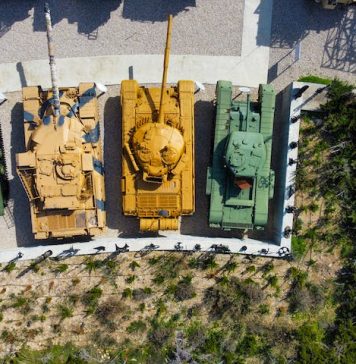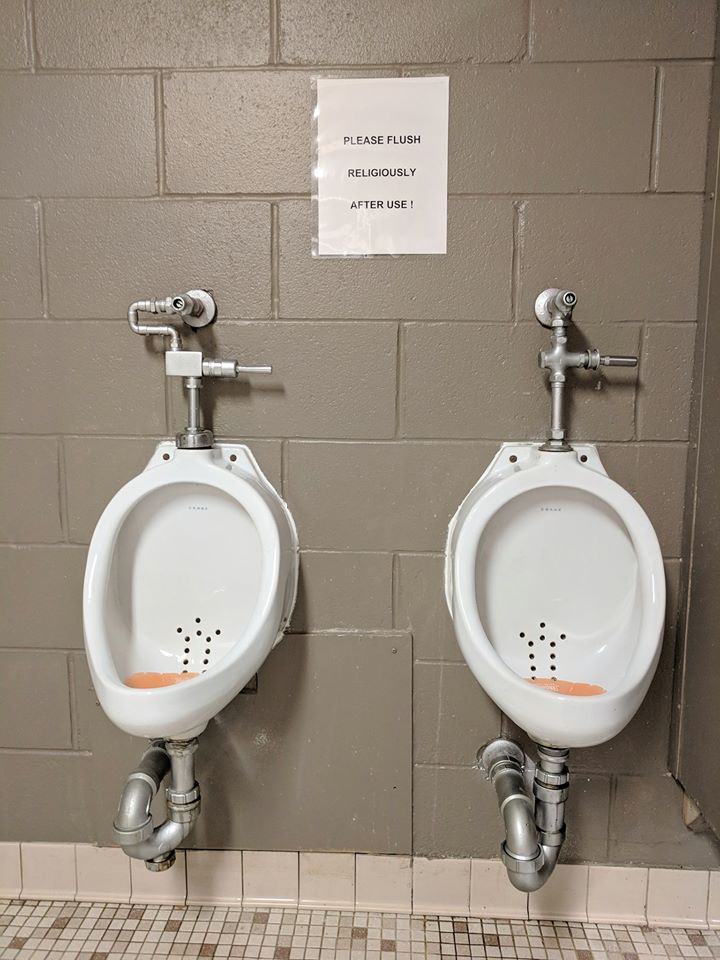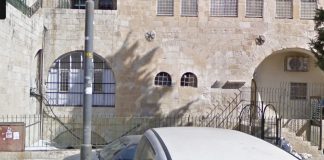There’s a little booklet you can get, and it tells you when you can worship God. He’s available from 6:43 AM until 8:42. After that he’ll be pissed that you missed your appointment.
There’s a Siddur you can get, with a compass in the cover. It shows you which direction you should point when you talk to God. You should face the center of the universe: Israel. There’s also an app for that.
It starts when you gird yourself like a lion to get out of bed. You thank Him for returning your soul with so much compassion and faithfulness. He’s got a perfect track record. If he didn’t, you wouldn’t know about it.
Then you say some gratitude prayers for the basics of life – that the earth floats upon the water and not the other way around. That you were not made as a non-Jew, or a slave, or a woman. That you have a belt.
And please God, make the words of Torah sweet in my lips, and in my lips of my children. Because if I hate it, and it makes me miserable and lost, it’s my fault; I didn’t pray hard enough.
Then you should list all the animals that would have been killed right around now as sacrifices in the temple, may it be rebuilt soon. It’s a long list. Almost no one says that part, but you are definitely supposed to.
It’s time to stand. Hold your Tzitzis in your right hand. Repeat the following paragraph with them pressed against your heart. Now kiss, release, and sit down.
Don’t continue yet, the guy leading the prayers hasn’t reached that point yet.
Now we wait.
Now we bow.
But don’t bend your knees, it’s not that kind of bow. It’s the other kind.
Thank you God, for creating light, and dark, and peace, and everything. Poetic, that “everything” bit, isn’t it?
Shema. This part is super important. People say it when they’re about to die. In fact, it might be a good idea if you imagine you’re about to die. It can help elicit the proper emotions, whatever those are.
Hear oh Israel. Adonay – master of all things, past, present and future. Elohenu – the powerful one. Adonay – still the master of all things, still past present and future, it’s only been two words since we last made this point. He, the aforementioned, is One. But not just one, but O.n.e. where you separate the O and the N and the E to remind yourself that he is one in the seven heavens and earth and all four directions. That’s how One he is.
The next part is said in a whisper. The part after that should be said out loud, in unison.
Be sure the enunciate clearly, I can’t emphasize this enough alongside all the other things that I can’t emphasize enough. There’s a book you can read on the topic.
And you shall love God with all your heart and all your might and all your soul. Remind yourself of this when you sit at home and when you commute, when you lie down and when you arise. Also, beware lest your heart shall stray and you worship other Gods and bow down to them. For then God will fume out of his nose and stop the rain, and there will be no more produce, and you’ll be annihilated off the land that he so graciously gave to you. It’s a clear progression.
It’s time to remember Egypt and how God took you out of there, it’s been a few minutes since we reminded ourselves of this fact. Your Tzitzit are there to remind you as well, so hold them in your hand and kiss them every time you say the word “Tzitzit”. If you’re a woman, you don’t need symbols like these to remember you left Egypt. Your period naturally connects you to time and space and you automatically remember you left Egypt. It’s pretty cool, really. Just remember to keep your elbows covered.
Ah, the Amida. The most important part of prayer. Here you get to talk to God, instead of in his general direction. These 18 blessings, (19 if you count them) pretty much cover anything you’d ever need in life – forgiving your sins, destroying the wicked, and resurrecting the dead.
You can take as long as you want and can add your own prayers at the end, that’s the appropriate place for them. You can even say them in English, because God can ignore you in any language you’d like. But don’t take too long, because the guy in front of you can’t take the three steps back to finish his Amida – let alone sit down – until you’re done, so try not to be a nuisance.
You might be wondering how prayer even works. Why would God need you to ask for things? Well, while you wait for the leader to loudly repeat the exact Amida prayer all over again, you can read the answer to that question in the introduction to your Artscroll Siddur. The answer is this: when you pray, you change, and you become worthy of God’s blessing. What kind of changes, you ask? Well, you remember how everything comes from God, which is the point of it all.
Other changes that may occur when you pray: obsessiveness, feelings of inadequacy and disappointment, rage. Tears of boredom and frustration.
If you prayed hard enough, Mashiach would be here already. But it’s not up to you, all of Am Yisrael need to pray hard enough for something that big to occur. And some Jews aren’t even praying at all, Rachmana Litzlan. They don’t even realize they’re Jewish! But if you prayed hard enough, then free-will be damned – they’d all become religious like you. So yes, it is all up to you after all.
Let’s wrap it all up with a list of incense ingredients.
You’re done for now. See you again in four hours.













